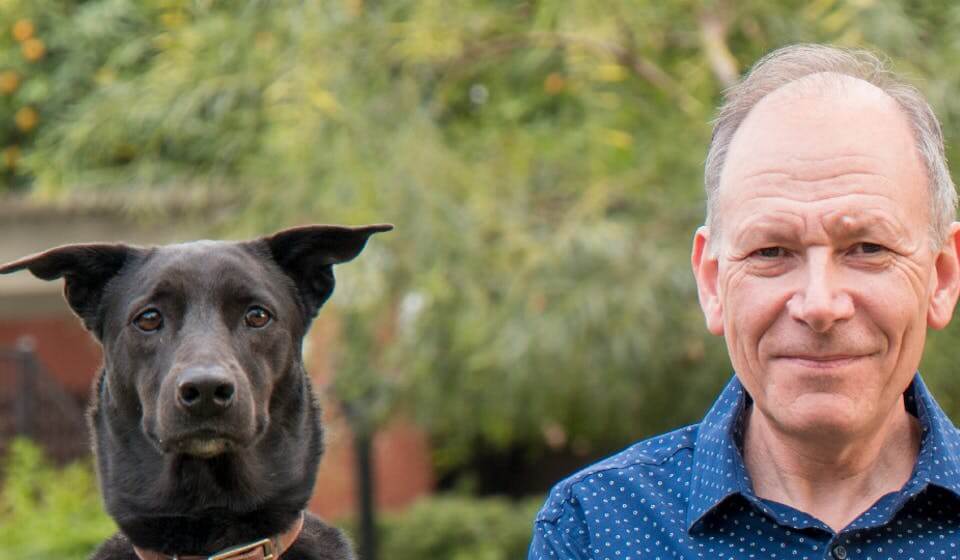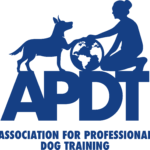
Animal behaviorist, author and Arizona State University professor Clive Wynne, Ph.D., will be the closing keynote speaker for the 26th annual APDT conference set Oct. 30-Nov. 2 in Portland, Oregon. His address “Dog Is Love” mirrors his book coming out September 24 and delves into his recent findings on what really makes dogs so successful with humans. He’s going to explain that unlike the breakup adage, “it’s not you, it’s me,” a dog’s love is all about them, not us.
Dr. Wynne, a native of the Isle of Wight off the southern coast of England, studied at University College London and received his doctorate at Edinburgh University. He has taught at universities in Germany and Australia, and then after coming to the United States, at Duke University, University of Florida and now Arizona State University in 2013. He is also the director of research at the Wolf Park, Battlefield, Indiana.
While he may be known now as a dog behaviorist, Dr. Wynne originally studied other species, specifically pigeons, rats, and tiny Australian marsupials called dunnarts. Over the years, however, Dr. Wynne found a way to “meld my childhood love of dogs with my professional training” and now studies and teaches the behavior of dogs and their wild relatives.
“It’s amazing what you can train a rat to do if you make it your business to train a rat,” he said during a recent phone interview. “The kinds of things you can train lab animals to do are really striking. Pigeons can peck on different keys to indicate whether the picture they are looking at is of a person, a flower, a car, or a chair.”
What impresses Wynne the most are sniffer dogs. “I’m always blown away by these dogs. Sniffer dogs don’t just emotionally save people’s lives — They quite literally save lives.” But Wynne then points out “you can train rats to do the same thing, but there are a whole variety of reasons why you don’t take a rat to the airport to sniff people’s baggage.”
As a professor, Dr. Wynne said he taught the “bread and butter” standard introductory animal behavior classes and one of the topics included dominance. “Biologists don’t get over excited by the concept of dominance,” he explained. “Some social species have to arrange themselves so they have a boss and subordinates, establishing dominance. Some species aren’t social, and others are egalitarian. It was never controversial. In fact, if anything, it was a difficult lecture to get through because it was a little bit boring, you know, it was chickens have a pecking order, and so on. But when I started moving into the dog world, I was astonished to find out the concept of dominance is so damn controversial.”
Dr. Wynne said he gradually learned there were high-profile television dog trainers “who bandied this term dominance about in this very naive way. It conjures up more of a kind of everyday association with the word dominance, like dominatrix, more than any connection with the professionals’ use of the term dominance in animal behavior.”
What happened then was animal behavior experts started taking up arms against the television dog trainers and contradicting that concept. “I fear the nature of the contradiction has been misplaced,” Dr. Wynne said, when animal behaviorists, even some he respected, began to argue that dogs are one of the social species that don’t experience dominance, an argument with which he disagreed. “I’m sorry, but I have to part ways. I’m convinced that dogs do experience dominance. They experience it in the good old-fashioned way that animal behavior scientists use the term dominance, just not in the super sexy way that certain television dog trainers use it.”
He believes our dogs are “acutely aware that we are in charge. In animal behavior dominance means control of resources. You decide when you go for a walk and where you go for a walk, you decide when your dog gets to eat and what to eat, you decide when the dog comes inside when it rains — we actually control every little aspect of our dogs’ lives. I love my dog to pieces, but there’s no way I’m going to open the door and just let her go outside. She needs me to make decisions for her. It’s a loving relationship I offer her – and what she demands and needs from me. That’s technically called dominance, just not what a layperson considers dominance.”
Dr. Wynne said animal behaviorists may need to come up with a new word term to better explain dominance, i.e., leadership, in the animal world, rather than how “some popular dog trainers muddled” it up. “Dogs deserve leadership based on compassion, not aggression,” he said.
Separating the wheat from the chaff of the word dominance isn’t Dr. Wynne’s only brush with controversy. He also has butted heads with the popular thinking that dogs are special because of their intelligence or genius. He drew social media ire last year when he called his beloved mutt Xephos a “loveable idiot” in an article in the New York Times.
But Dr. Wynne has the science to back up his belief: “What makes dogs special is not their intelligence or social cognition. Yes, dogs are very sensitive to people’s actions, but it is their amazing capacity, their desire, ambition, and hunger to form strong emotional bonds with people that really stands out. It’s their heart, and not their smarts, that makes them so amazing.”
He certainly doesn’t discount that dogs can be clever. He’s met Chaser, the Border Collie prodigy who was taught more than 1,200 names of stuffed animals by her owner, the late John Pilley, Ph.D., a retired psychologist. “I like to say I knew Chaser before she became famous,” Wynne jokes. Dogs like Chaser can be taught so much information because “of their amazing readiness to form strong emotional bonds. What makes it possible to train Chaser is that she wanted to work for him (Pilley). They are obliging.” And as Dr. Wynne pointed out earlier, you can train other species to also do amazing and striking work if that’s all you do with them.
Dr. Wynne is very excited about narrowing down the exact genes that make it possible for dogs to have such loving natures. One particularly valuable study involves comparing the genes of dogs to those of the tiny fraction of people who have a rare genetic disorder known as Williams-Beuren Syndrome (WBS). People who have WBS are described as having extremely extroverted personalities. He said the uncovering of genetic similarities between our dogs and people with WBS “is the single most exciting discovery” that is mentioned in his book, “Dog Is Love,” due out in September.
“Fewer than one in 10,000 people have Williams-Beuren Syndrome,” Dr. Wynne said. “The syndrome is caused by damage to a large chunk of a chromosome. It varies slightly from case to case, but around 28 genes are deleted, and among those 28 genes are three that have been identified as being crucial in making dogs the loving beings that they are.” Dr. Wynne explained there is a wide range of impacts for people who have Williams-Beuren Syndrome: “They don’t just have this extravagantly gregarious type of behavior. When 28 genes are involved, there will be a wide range of impacts. They also have strange facial structures, perhaps a heart defect, and they can also have intellectual deficits. But for two of the three genes that we found, there are occasional people with Williams-Beuren Syndrome who do not have damage to those two genes. If they do not have damage in those two genes, they do not show the exceptional gregariousness. There is a very strong connection with the gregariousness aspect of the syndrome. People who have alterations to these two genes, like dogs, have an amazing engagement in forming relationships, a hyper-sociability and extreme gregariousness.”
Dr. Wynne said there are other fascinating studies coming out of Tokyo, Japan, including one tracking how levels of the hormone oxytocin (a neuropeptide that impacts brain cell activity) spike when people and their dogs who are in a strong relationship look at each other. And if oxytocin is sprayed up a dog’s nose when that dog looks at his/her person, that person’s oxytocin level increases on its own.
Those studies back up Dr. Wynne’s theory that “dogs love us, but their love for us isn’t about us. It’s about them.” Dogs haven’t just evolved to form strong bonds with humans, but to form strong bonds with just about anything they grow up with. It is what explains how dogs, like Great Pyrenees, if they grow up with sheep, will zealously guard their herd, and that the love dogs experience can be expressed towards goats, chickens, and even penguins. Dr. Wynne mentioned Middle Island off the south coast of Australia, where a colony of little penguins was decimated by foxes who crossed from the mainland to the island during low tide. Livestock guarding dogs, raised alongside penguins were brought to the island where they now protect the penguins from predators. The dog’s ability to develop emotional bonds with “whoever happens to be in their world, especially the first three months of their lives,” is what makes them unique, Dr. Wynne said.
“Your dog is a very intrinsically loving being who needs the opportunity to be engaged in a reciprocated loving relationship and that should shape how we live with our dogs.” Dr. Wynne said. “One of the cruelest things we can do to our dogs is leaving them locked up at home alone for hours at end.” He is really impressed with laws in Sweden that ban leaving your dog home alone for more than four or five hours. “I think we should strive to follow Swedish law ourselves. It is tremendously cruel to leave these highly, highly social animals alone so much of their lives. We certainly should not be using force on them, but on the other hand, we shouldn’t try and abdicate our responsibility to provide them with loving leadership… Sometimes we are going to have to apply the brakes, like you do with children, but do it in the gentlest way with the leadership we provide,” Dr. Wynne concluded.



